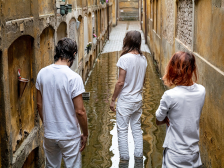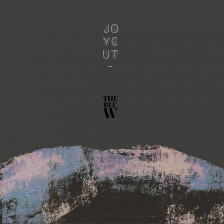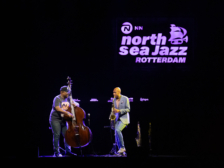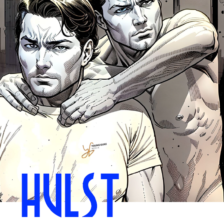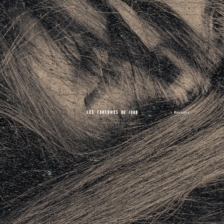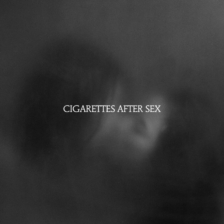A voice for the vulnerable – an interview with Pasco Pezzillo from Joycut (EN)
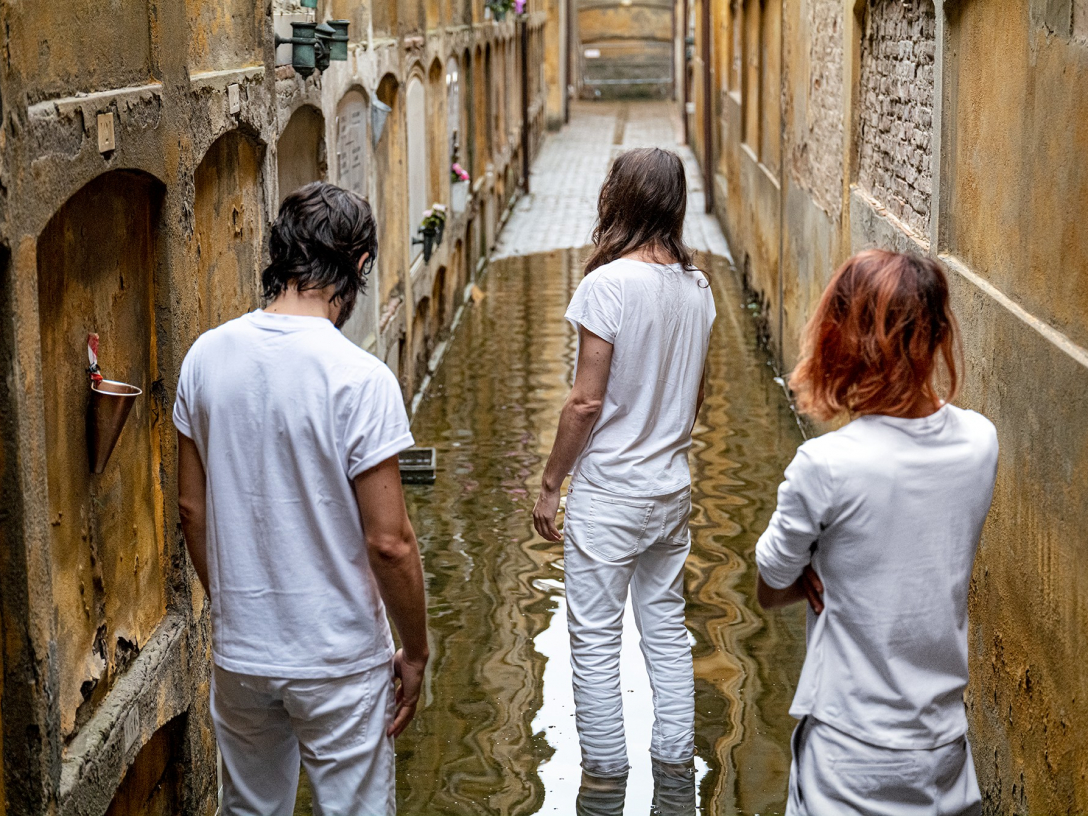
On May 20th, the Italian band JoyCut, launched their new album TheBluWave at an expo/installation in the art museum of Bologna. For the first time, the album from the electro/postrock/darkwave band was played in its entirety for a large audience. Soon after the event, TheBluWave was released digitally. Early August the physical release of the album took place. The full title of the album is as follows: TheBluWave [TimesWhenSilenceIsAPoem – TheIceHasMelted – AndBleedingGlaciersFormOurTears]. High time for the third part in the JoyCut trilogy; an interview with band member Pasco Pezzillo.
(The Dutch version of this interview was published by Written in Music on July 18th.)
WiM: How have the responses to the album been so far? At the MAMbo and later, since June 5th?
The experience at MAMBO was designed to be unique. Only that day, only that time, only those 76 minutes, only those 4530 seconds. And, only for the 250 people present_
°°° i n t o t h e B L U, a short documentary, will be soon available so that others can finally immerse themselves in our BLU. From the release of the album to today, about twenty days have passed, too early to draw a line and collect a data that is not approximate. We must say that the reviews, so far, are certainly moving. It’s a difficult album, it really needs to be listened to all in one breath right up to the end to be able to grasp its consistency. You cannot review it by browsing quickly or skipping from one track to another in search of the refrain [which is not there]. This is why its ideal use is on vinyl, because when you have a vinyl and you put it on, it means that in that moment you are ready, it means that in that moment you have time. Personally, the best review we could ever dream of receiving came from Mr. Robert Smith who, as always, is demonstrating once again his very rare sensitivity, his support, lending his voice to our cause otherwise unheard by others, the main stream in particular.
WiM: You have been touring a lot since 2013, not releasing new material as JoyCut (as far as I know). Can you tell us a little bit about these past ten years? Has the music always remained at the forefront or were there slow times? How did travelling influence you?
We haven’t released any new music as JOYCUT in the last nine years but we have played a lot, maybe too much, if you ever may say “too much” when you think of music. And in these journeys, while on tour, we have grasped and collected the necessary imagery to open up an intense vision of the world, immersing ourselves completely in the organic flow of relationships with others, with the most distant and fascinating cultures. Japan has remained in our hearts, it has consolidated in the bowels.
The invitation to the Venice Biennale, dedicated to the East, allowed us to develop a new language. Whenever we are invited, outside of a tour, to play a one off show, we build something ad hoc for the occasion. Out of respect for those who ask for us and always to raise our bar, for ourselves, in order to collect new stimuli. So that performance became a six-act Opera “KOMOREBI” whose core allowed us to develop the idea of TBW. The same thing happened for the Meltdown Festival curated by Robert Smith. The Meltdown is known for its peculiarity of offering unique shows, philologies of entire albums, special collaborations … and, following the flow of the Biennale, there we allowed ourselves to land with all the production and, given the cosmic opportunity, we strongly wanted to thank Robert Smith for that lovely invitation, dedicating him a performance that already anticipated the tracks of the new Album. And so it was. We split the show into two acts. In the second we have fully performed almost all the tracks present in TBW today.
And then Covid, silence, desperation, the deaths of our loved ones, the lockdown. I took the album back in my hands. Distorting it. Ringing it out. Remixing it. Giving it a second life before it had even lived the first. It was a heartbreaking, very profound, therapeutic, psychoanalytic, moving, unrepeatable work. And here it is. A pure creature. Which is no longer ours. That is why we ask to take care of it_
WiM: Have you been inspired by groups, writers, artists, politicians, media figures that came up these past ten years? Who have been important for you, an influence for a longer time already? How did JoyCut start out back in the days?
We are fascinated by the human, from the mankind unique ability to respond to adversity and to intuit [almost always spiritually, even when it comes to scientific theories] the most adequate solutions. This is why, starting from the fathers, the Greek philosophers, up to Darwin or Ungaretti, I believe that the example of the human being, in its creative process, in its pioneering, in its inadequacy towards the status quo, must always be told, not only through literature but also in music. Figures like Alex Zanardi, for example, are dominion of the universe, a Unesco heritage, wonderful creatures. And then, since this band is on its feet, the quotes and thanks to the seminal cultures, to the good and bad influences have always been present.
This album is a collection of artistic paths connected to the meaning of BLU, an infinite literature full of identity references to be preserved and overcome: Glove’s Blue Sunshine, New Order’s Blue Monday, Pablo Picasso’s “Blue Period”, Miles Davis’ Kind of Blue, Matisse’s Blue Nudes, Nick Drake’s Way to Blue, Raymond Queneau’s novel The Blue Flowers translated by Italo Calvino.
JOYCUT was born with the ambition to translate into music the fragile and violated cry of nature, of the least, of the disadvantaged, of the vulnerable, to which we ourselves belong. We still listen to a lot of music, especially picking up from the past. Discovering future from the history. A past that is timeless, in its own experimental and pioneering era, in the form of sound or poetic language; from Luciano Berio, Morricone, the Italian songwriters, to Bowie, to the New Wave of Joy Division, to the eternal love for The Cure; from the ambient scene of Harold Budd and Brian Eno, to the 4AD scene; from the industrial of Einstürzende Neubauten, NIN, to the latest giants such as Johan Johansson.
WiM: Can you tell a bit more about the ideas, thoughts behind the following songs? If you prefer, you can keep it generic or open to interpretation of course…
PLATO|Shirakaba_
Shirakaba is the beautiful and unique Japanese White Birch, but is also The Shirakaba-ha [⽩樺 派, the”Society of White Birches”], an influential Japanese literary coterie, which published the literary magazine Shirakaba, from 1910 to 1923. The White Birch, like a butterfly effect, is linked to the longevity of the culture and tradition of values related to the highest good. What remains of our Europe, of the European dream, has destroyed Greece but not its ancient culture, not the hyper-hard teaching of our true founding fathers. We are Greeks. And as Virgina Woolf reminds us in her work On Not Knowing Greek: ‘it is to the Greeks that we turn when we are sick of the vagueness, of the confusion, of the Christianity and its consolations, of our own age’. Plato is the smile of the Sun, seen as the Highest Good as an incessant struggle against Radical Evil. But beware, it’s not said that the sun will rise again tomorrow …
This composition is a hymn to the fragility of the balance of the entire existence. A voice that eventually becomes a cry … a warning to remind us that nothing is forever, and that what we take for granted does not necessarily have to be, with the sun it would end life itself because metaphorically when we close our eyes for the last time, it is darkness that reigns. As long as we can, let’s open up to the light, smile at the sun and welcome “his” smile. The last track of our albums, since the first one, has always had the role of being a bridge. A conjunction between the sound just completed and the possible sound of the future one. In this composition there are all the distinctive codes of this work, of the past ones, and a projection towards emptying, a research process still in progress. Born on the piano, embellished by Mauro Malavasi’s trumpet and Vince Pastano’s dreamy guitars … it couldn’t be but the closing track. Guitars inspired by To Wish Impossible Things allow you to float in a lulling suspension. This track is an open question. And in its dynamic development, between detuned orchestrations and electronic narratives collected by analogical processors, it assumes weight and lightness. One last hug of love and tenderness to leave a moment of peace and emotion.
Siberia [BeforeTheFlood]_
Tracks like Siberia [BeforeTheFlood] and Antropocene are violent furies, screaming despair | We physically and mentally experienced pain to give voice to the violated nature, to its unequivocal cries, evoked through a sound only seemingly without voice, which beneath the surface communicates, expresses and captures, above the harmony. “Climate change is not problematic if it is considered as an acquired adaptation by the biological system to exist and preserve itself. It is a cataclysm for mankind; which has finally at least taken the first step naming it “climate crisis”. But this is a crisis for humans, because they risk mass extinction”. Forests burn continuously. Nobody talks about it. When I was in the mixing phase, the Siberian one was told all over the media. Well, despite the images, the environmental catastrophe, the animals on the run, a devastated ecosystem … the world has not stopped, because the world is only interested in the purpose of a few.
There are music and compositions in the history of JOYCUT that manage to give vent, through the sound and its elements, to rages hidden very deep. A ritual that highlights what reasonableness cannot contain. It happened in DEUS, in DARKSTAR, in this album with SIBERIA and ANTROPOCENE. No composition can ever be planned or programmed, therefore when the mood is able to tell the indignation of one’s interiority, its discomfort … facing the emotional push is a very painful psychophysical process. Siberia is proof of this. It all started with a melody that had been lying somewhere for some time. It often reemerged. Until I was able to fully grasp it. Around us we have built the natural element that could give it voice. Horns, hypnotic bass, recordings of fires, a piano drowned in a very long delay, along with all the distortion and saturation. Because this is how an animal feels when it is condemned, this is how an ancient forest feels when it cries and cries, this is how we feel, when we are deprived of the caresses of the trees. I wanted the destruction to end with a hope … we can bring the human being to its last stage, devastate nature … but sooner or later … a form of life will see the light, a plant in the rubble will be able to find its space … and the final notes, detached from everything else … evoke this delicate conviction. A wish so that our sensitivity can wake us up from the sleep of reason.
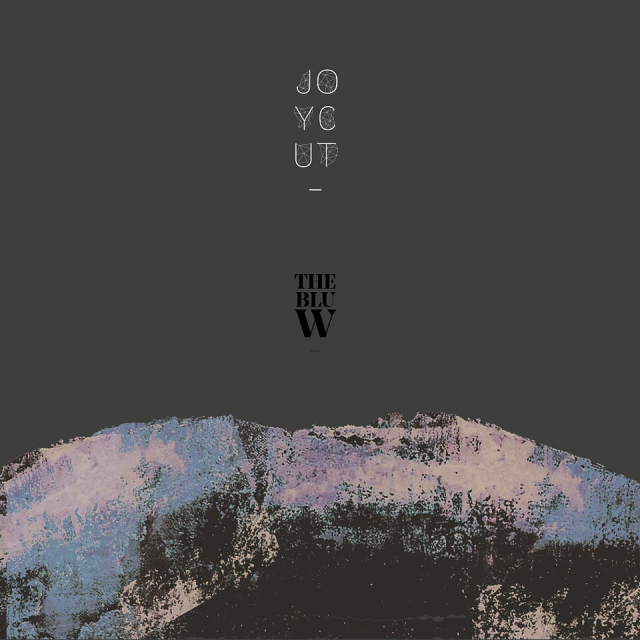
Lisantrope_
Dedicated to Pasquale Pezzillo, born on April the 2nd, 1920, on his hundredth birthday. Dreamer, Pioneer, Soldier, Husband, Father, Grandfather. Centenarian during the 2020 pandemic. LISANTROPE is a word he invented in the years of his youth. A 10-letter code, corresponding to 10 numbers. This is a classic song came all by itself. Suddenly and without any interruption. Played and recorded. Sung with the deepest love that exists. Dear grandfather, you will always be with me.
Francis&Violet_
Francis and Violet are just two lovers. Two sad lovers. Sad lovers kiss longer and tenderly. Their faces become one as if in a superimposition of shades. The surrogate reality of cities, incipient ideologies, stereotyped faces and forced expressions, represent the tangible sign of a ferocious nihilism. In this composition there are “attempts at tuning” which are transformed into ensemble sound. Until it reaches its fullness when a drum orchestra aligns itself with an all-African melody. As for BLUTOKYO, as for KOMOREBI, this track closes a trilogy of compositions linked by the same expressive need. Look for the light in the hidden ravines of marginality. Giving a multi-perceptive face to the dynamism of existence. Written on the piano and modulated with electronic interventions, clarinets and oboe, Taiko, Dundun and analog saturations. Distortions, feedback and very long reverbs. A track full of dynamics and suggestions. It needs a lot of listening to reveal the entire production structure to the ears_
Ungaretti_
Perhaps it is the track closest to a song form, close to a culture of formative listening that comes from the past. As for Ungaretti, the poet, this experience is linked to the hermeticism of the lyrics, in an open space that allows each sound to expand infinitely. Ungaretti was, and still is, the only individual able to tell without telling, to show without being able to show, to lead you into his bowels and leave you torn apart by the abyss of human suffering. A tremor hidden in the trenches of a senseless war, which unfortunately still today has never finished massacring consciences. Wounds never stop hurting. The insistent search for a delicate, powerful but fragile trail, not predominant but continuously present, has given rise to the constitution of harmonic weaves that have allowed the sound to generate and regenerate itself. The singing had to be distant and surprisingly serial, broken, a forgotten code on a tape that spins around in circles.
WiM: Listening to and reading about TheBluWave, one might say that you may not limit yourselves to clubs/music stages only but also perform in art centres, museums, gatherings and environmental, climate related events. Do you have (international) touring plans?
You know, we believe that music must be welcomed everywhere and that certain other, alternative spaces must be conquered. The container and the contents must match. Sometimes a classic venue isn’t enough. Nor should we fall into the trap that only if you play some clubs or at certain Festivals you can be valued and evaluated. For us, music must adhere to the needs of sound and not only from a technical point of view but also from a narrative point of view, placing meaning. For this reason, yes, we are planning shows in different locations, from the theater to the classic club but also cultural centers, museums, abandoned places. We will continue to carry out the installation of the MAMBO wherever possible. Meanwhile, I can anticipate these three dates as tickets are going on sale in these days:
UK, London, Colors|Hoxton_
Belgium, Brussels, Botanique Rotonde_
France, Paris, Point Ephemere_
WiM: Regarding the above. You, for example, performed at a Sardines demonstration. That must have been truly special. What has been the effect and influence of the Sardines movement on the population, on society and maybe the way politics are running?
Initially, especially in Bologna, before they became a national phenomenon, and even before they became politically involved … Sardines represented a social antibody to the populist spirit, to the rise of the right in the country. Thanks to the rallies they have been able to organize, thousands and thousands of people in the Italian squares have become a social body. Through the unity, the sharing of a discomfort, of a political void, they were able for a “season” to bridge the gulf left by the lack of representativeness between citizens and government. This state of affairs is still present. The covid has devastated being together. It has swept away the raison d’etre of the Sardine’s philosophy which, precisely in the movements from below, such as Friday for future, identified itself. The day we played for them, in Bologna, there were more than 40,000 people. 40,000 people united by the same sense of nausea for corrupt and decadent politics, 40,000 people, in a single city, disgusted by the deception suffered in recent years.
We do not have a prime minister elected by the people. We are commissioned at the behest of others’ forces. Our history, our millenary culture, like Greece, in the pay of the “good guys”. Now, the ecological transition, then the digital one, together with the health emergency, the war fueled so fiercely, outline a future devoted to very accelerated strategic changes, without the involvement of people, subjected by fear. The future is very critical for those who want to disagree, however we cannot afford to be gagged. More than ever we must fight for our rights which, I remember, are inalienable, are a precondition for existence, come before the law or any particular decree.
WiM: You have been working with, collaborating with the likes of Robert Smith, Chemical Brothers. How did they know you? Additionally: which of your releases or other activities have carried your name across the borders, e.g. to the UK?
The Chemical Brothers offered us the chance to tour together on the Italian shows and then we did, but we never -artistically- collaborated with them, we talked mainly about football in the backstage, in that particular moment of Guardiola’s Manchester City, nothing more. Same thing with Robert Smith. With him there is a personal emotional bond. We are talking about my undisputed idol, the artist who made me fall in love with music and who, once listened to his music, made my heart beat to the point of saying: “I want to do this in life”. A wonderful story. We were invited to his Meltdown Festival in London, he was the curator at that time, within his very personal selection that ranged from bands like us to those that have held generations together. We were invited as headliners, despite being completely independent, without a label, without a strong structure behind, if not ourselves. Over time, a relationship of maximum trust and solemn respect has arisen, I would never dare ask to collaborate, unless he would asked for it. I have too much love for him as a person to crush, for the sake of a futile self-interest, a relationship that goes beyond being musicians. The only thing I can do is continue in his wake, try to keep faith with an attitude of making music that is being lost, rich in principles and strength, which stems from the need to overturn the systems of strength and to manage the market by violating it the rules. I worked as a producer with Jason Albert, Bocelli, and others … but my place is just for and forever in JOYCUT.
WiM: Is TheBluWave a conscious start of a new phase in JoyCut’s life or don’t you feel it that way? Are you already running whole new paths? The music is less vocal perhaps but there may be more worth mentioning. How does the new album relate to and/or differ from your previous work?
This album is a work in itself, and always will be. It was designed to remain, to stand the test of time. It can never even be approached by what we will do in the future. During the last three years I have written a new chapter that will only come out when TBW has obtained and conquered its space. TBW is the realization of our ambitions. A double album full of sounds. Full of music. Outside of any market logic. Released on Sunday with a very long title, to disrupt digital platforms. An album totally alive, true, real, delicate and violent. It’s a testament. Compared to the other works it is so full of pain and hope that I am moved by the mere thought. I wasn’t hoping to get it done. You have to know that for a band like us, there will never be a new album, a new tour. We don’t have any support. Therefore being able to stand is the most rewarding reason. Especially when it is done with the dignity with which we do it. A dignity addressed to music, we are here to serve it and that’s it.
WiM: It’s remarkable you referenced the book about Blue from Pastoreau in the press releases. I was and still am reading that very book here (!). Could you (once more) explain the importance and meaning of Blue regarding your latest work?
In the words of the anthropologist Michel Pastoureau – BLU is the color that between the 12th and 14th centuries dissolved the millennial chromatic system which until then was organized around white, red and black | The same color that in the Age of Enlightenment and even more so during the Renaissance became a symbol of feelings, melancholy, freedom, ideals and dreams | suggestions that illustrate well the magnitude of this fourth work. The next step in an artistic path connected to an infinite literature full of identity references to be preserved and overcome: love’s Blue Sunshine, New Order’s Blue Monday, Pablo Picasso’s “Blue Period”, Miles Davis’ Kind of Blue, Matisse’s Blue Nudes, Nick Drake’s Way to Blue, Raymond Queneau’s novel The Blue Flowers translated by Italo Calvino. “The deeper the blue becomes the more strongly it calls man towards the infinite” declared Kandinskij.
“Blue is the idea of peace acquiring a note of poignant sadness when it sinks into black: it fully describes the urgency of this moment in time, of our sound that always searches for light in the darkness, and which in order to find it, prepares itself in the precipices, in the ruins, in the hell of the supreme fear”. The main title is intended to identify ourselves in our own musical genre, just like a Manifesto. Ours is the blue planet, a planet on its knees, our home, irreplaceable place. Writing BLU and not blue is a defense of (Italian) linguistic identity in a global society violated in its own roots. English remains, nowadays, a code that, used like we do all over the world, as it was for Latin, is doomed to become unfortunately, less and less significant and meaningful. For this reason, in sign of respect for all the languages of the world, is important to be using also our own one, globally. The blu wave is a fluid, organic, overflowing, superabundant representation of our vaporous and evaporated world-system.
WiM: Is there anything else you would like to add, underline or tell us?
This album is for all our loved ones, the vulnerable, the fragile, the marginalized and the excluded”. Hope is in action. Beauty is everywhere. In the most hidden ravines. Into the dark. In marginality. In the eyes of those in front of us. When two people meet two stories meet. And when we are together, writing our common story, hope always wins. Hope transmutes all that it touches.
Band photo: Margherita Caprilli
